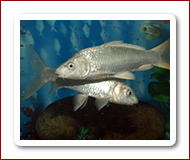| BS Zoology |
Introduction Fisheries is an important economic sector in Pakistan, contributing to income generation, poverty alleviation, employment, and export revenues. Pakistan is endowed with rich fishing potential. This sector makes significant contribution to the national economy, contributing about one percent to GDP and providing jobs to about one percent of the country’s labor force. Our goal is to provide students with the knowledge needed to make wise decisions on issues of sustainable aquaculture, conservation and ecosystem restoration. Sustainable use of aquatic resources is a global, national as well as local issue. Balancing the needs of expanding human population with the need for preservation of water quality and aquatic fauna requires a fundamental understanding and management of these resources and that can only be gained through education and research. On the other hand, aquaculture is the fastest growing segment of the agriculture industry. Coupled with cutting edge technologies of the day, it has become one of the most expanding and rapidly changing fields. The Department is carrying out teaching and research in both basic and applied aspects in the frontier areas such as development of cost effective fish feed, artificial fish breeding, biotechnology, aquatic environment, fish pathology and parasitology, use of biofertilizers in aquaculture, aquaculture in saline water ponds. The BS degree programme addresses the needs for sustainable development of the country's fisheries resources and respond to the call for production of highly trained manpower in the field. Its curricular offerings aim to impart to students both, theoretical knowledge and practical skills as well as develop analytical capabilities as a tool toward innovative solutions to fisheries and related programs. The BS in Zoology (Fisheries / Wildlife) offers extensive coursework in the major areas of fisheries science and aquaculture. The Fisheries and Aquaculture program offers students a hands-on experience raising local fish and shrimp species, and enriches them with diverse fisheries management field experiences. The faculty’s natural setting at Ravi campus, Pattoki will provide students with an "outdoor aquaculture laboratory". Different lakes, ponds, streams, and rivers in the vicinity will be regularly visited for field work. In addition, students will also have opportunities to conduct independent research on addressing new available technologies in fisheries and aquaculture. The graduates after completing their degree programmes have opportunities to enter in a diversifies areas of fisheries & aquaculture field like fish farm and hatchery managers, academia, researchers, entrepreneurs, stakeholders, etc. |


